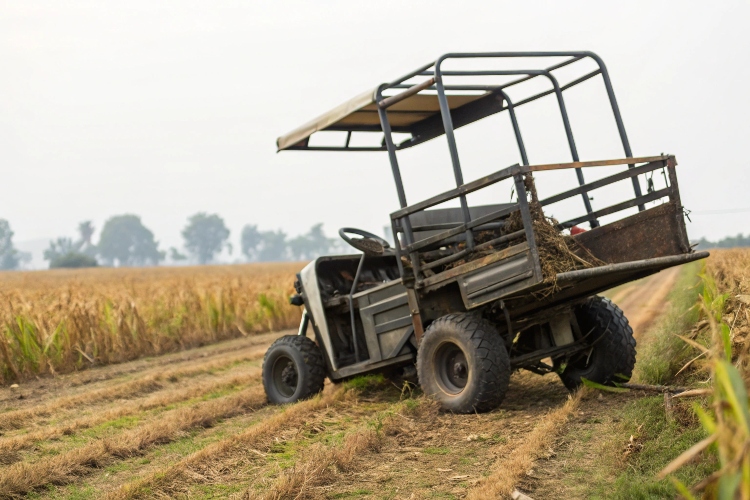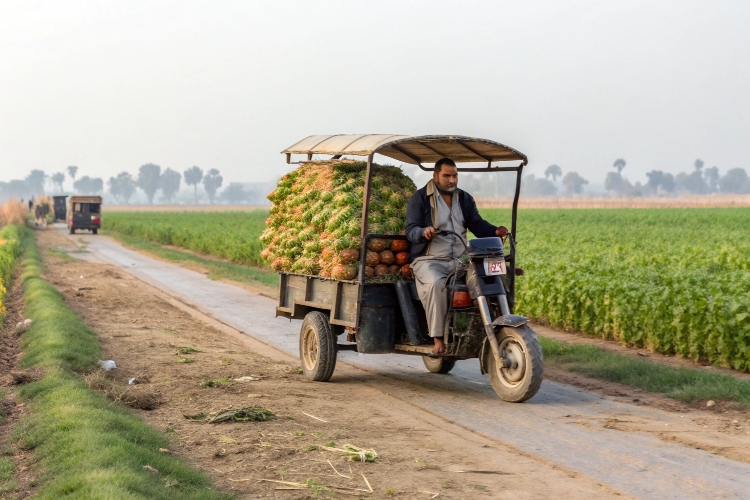A broken-down rickshaw during harvest means lost time, lost crops, and lost income. You rely on this vehicle every day, but are you giving it the simple care it needs to survive the tough farm environment?
Your electric farm rickshaw is low-maintenance, but not zero-maintenance. A few simple, seasonal habits focusing on the battery, tires, and frame are essential to prevent costly breakdowns during critical planting and harvesting periods.

For a farmer, a vehicle is a critical tool, just like a tractor or a water pump. And like any good tool, a little preventative care goes a long way. The needs of your rickshaw change with the weather, so you can't treat it the same way in the dry season as you do during the monsoons. Let's break down a simple year-round maintenance plan that will keep your workhorse running when you need it most.
How should I prepare my electric cargo rickshaw for heavy summer heat or rainy-season operation?
Scorching sun and sudden downpours are a daily reality. An overheated battery or a rusted frame can halt your work instantly, right when you're busiest.
In summer, always charge your rickshaw in the shade to protect the battery. During the rainy season, prioritize parking under a roof and washing off mud to prevent corrosion.

Heat is the number one enemy of battery health. We always tell our clients to follow one simple rule: if it's too hot for you to stand in the sun, it's too hot for your battery to be charging there. High temperatures during charging can permanently reduce the battery's capacity and lifespan. It's a simple habit that costs nothing but saves a lot of money in the long run. Always find a cool, ventilated spot like a barn or under a large tree. For the rainy season, the enemy is moisture and corrosion. Farm soil, and especially fertilizers, can be highly corrosive when mixed with water. Leaving a mud-caked rickshaw to sit will slowly eat away at the paint, the frame, and the electrical connections. A quick rinse with a hose at the end of the day is the best way to prevent long-term damage. For clients in extremely wet or coastal areas, we often recommend upgrading to a stainless steel cargo bed for maximum durability.
What maintenance steps help protect the battery and motor during cold or humid months?
Cold weather suddenly drains your battery's range, and constant humidity can cause electrical problems. You could get stranded far from the farmhouse, all because of the weather.
In the cold, charge the battery in the warmest possible area to maximize range. In high humidity, keep electrical contact points clean and dry to prevent connection issues.

An electric vehicle's battery is a chemical device, and cold temperatures slow those chemicals down. This means you will get less range from a full charge in the winter than in the summer. To fight this, manage the battery's temperature. If your battery is removable, bring it inside the house to charge overnight where it's warmer. If it's fixed, try to park the entire rickshaw inside a garage or barn. A warmer battery will perform much better and give you more predictable mileage. In humid months, the challenge is moisture getting into the electrica. You don't need to be a mechanic. Simply use a dry cloth to occasionally wipe down the controller box, the motor casing, and any visible connectors. This small step prevents the slow buildup of corrosion that can lead to power cutting out unexpectedly or, in worse cases, short circuits. It takes less than a minute but can prevent a major headache.
How can regular checks on tires, brakes, and chassis prevent costly downtime during busy farming seasons?
You’ve loaded your rickshaw to the maximum for a big harvest run. Suddenly, the brakes feel weak on a slope, or a tire blows out, risking your safety and your cargo.
Never overload your vehicle. Before hauling heavy cargo, perform a 2-minute check: look at the tire pressure, squeeze the brake levers, and glance at the frame for any visible stress.

The single most important piece of maintenance advice we give is to respect the payload capacity. Overloading is the fastest way to break your vehicle and is extremely dangerous. A heavy load puts immense stress on every component. A simple pre-ride check before you load up can save you from a disaster. Think of it as a quick walk-around before you start your day's work. This simple routine will help you catch small problems before they become big, expensive, and dangerous ones. It builds a habit of awareness about your vehicle's condition, which is essential for any piece of critical farm machinery.
| Tarkibiy qism | What to Check | Nega bu muhim |
|---|---|---|
| Shinalar | Are they properly inflated? Look at the sidewall for the correct pressure (PSI). | Under-inflated tires can't support the weight, leading to blowouts and poor battery range. |
| Tormoz | Squeeze the levers. Do they feel firm or soft and spongy? | Spongy brakes won't have the power to stop a heavy load, especially on uneven terrain. |
| Chassis | Glance at the main frame welds, especially under the cargo bed. | This is where stress from overloading will appear first as small cracks. |
What simple storage and cleaning habits keep a farm tricycle in top condition all year round?
After a long, tiring day, it’s tempting to just park the rickshaw and walk away. But leaving it exposed to the elements is like throwing away your investment piece by piece.
The best habit is to park your rickshaw under a roof. This simple act protects it from 90% of weather-related damage. Wash it regularly, not for looks, but to spot problems early.

Think of a simple roof or lean-to as the most important accessory for your rickshaw. Direct sun ages tires and makes plastic parts brittle. Rain and morning dew cause rust. Parking it under cover is the easiest and most effective way to extend its life. Cleaning is also a maintenance task. When you wash off the mud and grime, you're more likely to notice a loose bolt, a frayed wire, or a small crack in the frame before it becomes a major failure. If you plan to store the rickshaw for the off-season, there's one more trick: don't leave the battery fully charged or completely empty. For long-term health, a battery is happiest when stored with a 50-70% charge. Just check it once a month and give it a short charge if needed. This prevents degradation and ensures it's ready to go when the next season begins.
Xulosa
Your farm rickshaw is a tough machine, but it isn't invincible. These simple, seasonal checks ensure it's always ready to work as hard as you do, season after season.

